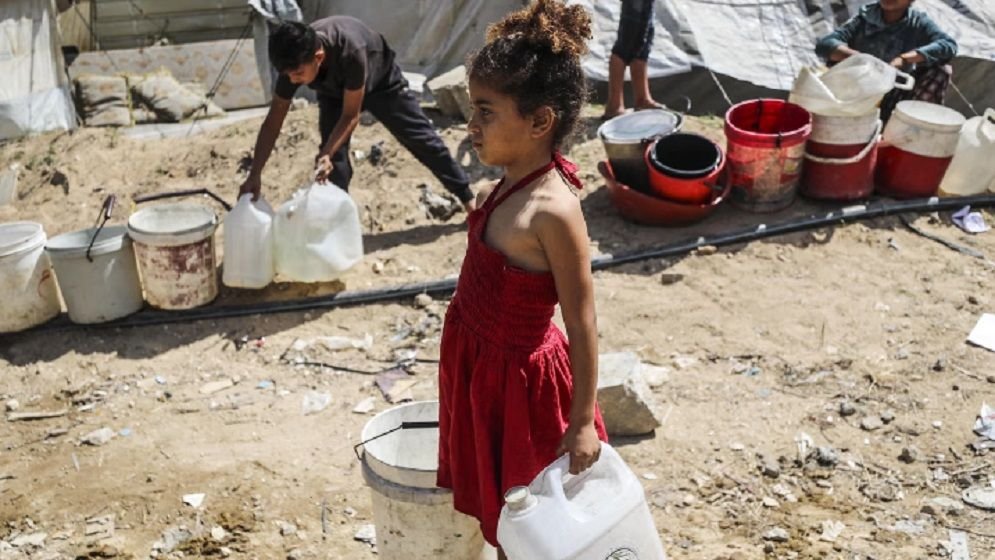Gaza’s Children Forced Into Adult Roles Amidst War
The relentless conflict in Gaza has stolen childhoods from an entire generation, forcing Gaza’s children to take on adult responsibilities far beyond their years. Where there should be laughter and play, there is now only struggle and survival as these young souls navigate a world of hunger, thirst, and constant danger.
Twelve-year-old Jana Mohammad embodies this tragic reality, her small frame straining under the weight of water buckets as she navigates Gaza’s treacherous rubble. The pink sweater she wears serves as a haunting reminder of the childhood she’s lost. Since an Israeli sniper killed her older brother, Jana has become the primary caregiver for her ailing parents. “I don’t want my father to suffer,” she says while waiting in line for water, her voice carrying wisdom far beyond her years. “He has heart problems. If he tries to carry water, he’ll collapse.” What should be a simple childhood chore has become a daily battle for survival for Gaza’s children.
In Deir al-Balah’s makeshift market, another of Gaza’s children carries burdens no child should bear. Thirteen-year-old Khaled Abu Hasira has transformed into his family’s sole provider, selling tea and coffee after his father perished in an airstrike. His mother, now living in a ragged tent, watches with equal parts pride and heartbreak as her son negotiates with customers. “Khaled aged ten years in months,” she whispers. “This war took everything – his toys, his school, his childhood.” The stall that should fund pocket money now pays for their next meal, a common story among Gaza’s children.
Further north, twelve-year-old Abdullah Salah has become both hunter and chef for his extended family of twenty. Each dawn finds him cleaning their tent before embarking on a daily quest for food and fuel. “No wood, no gas, no flour – nothing’s left here,” Abdullah explains while preparing a meager meal. Like many of Gaza’s children, he walks miles daily to fetch water, his small arms trembling under the weight of containers meant for adults. The kitchen skills he should be learning for fun have become essential for his family’s survival.
These three stories represent thousands of Gaza’s children thrust into adulthood by circumstance. Psychologists warn the trauma will leave permanent scars, with normal developmental milestones replaced by survival instincts. Where schoolyards once echoed with games, children now compare strategies for finding clean water and avoiding sniper fire. The United Nations reports that nearly all of Gaza’s children show signs of severe distress, with many developing war-related anxiety disorders.
The physical toll matches the psychological damage. Malnutrition stunts growth, while contaminated water breeds illness in bodies too young to fight it. Aid workers report children as young as eight showing signs of arthritis from carrying heavy loads, their developing bones buckling under weights meant for grown shoulders. Dental records reveal accelerated aging, with stress hormones causing premature wear on baby teeth.
Yet amidst the horror, Gaza’s children demonstrate astonishing resilience. They’ve developed complex barter systems, learned emergency first aid, and created protective networks for younger siblings. Some have become adept at identifying different munitions by sound, a survival skill no child should possess. Their drawings, once full of sunshine and rainbows, now depict tanks and funerals with disturbing accuracy.
International organizations plead for ceasefire, warning that an entire generation is being shaped by trauma. “We’re not just losing homes and buildings,” says a UNICEF representative. “We’re losing future teachers, doctors, and leaders to unprocessed grief and stolen potential.” As the world debates geopolitics, Gaza’s children grow up in weeks what should take years, their childhoods sacrificed to a war they didn’t create but must endure.
The stories of Jana, Khaled, and Abdullah reveal the hidden casualties of conflict – not just lives lost, but childhoods erased. As they trade textbooks for water buckets and playgrounds for market stalls, Gaza’s children become living symbols of war’s cruelest theft: the stolen right to simply be young. Their forced maturity serves as the conflict’s most damning indictment, proving that even those who survive physically may never recover what war takes from their souls.
Each day brings new challenges for Gaza’s children – finding medicine for grandparents, comforting terrified siblings, pretending not to be hungry so others can eat. They’ve become experts in rationing and risk assessment, their games replaced by grim calculations of survival. The world watches as an entire generation of Gaza’s children learns the hardest lesson of all: that sometimes, simply living requires more courage than any child should possess.
As international aid slowly trickles in, it’s these young caretakers who often distribute it most fairly within their communities, having developed an acute sense of justice from their suffering. Their wisdom breaks hearts even as it inspires – proof that even in war’s darkest moments, the light of childhood innocence, though dimmed, cannot be entirely extinguished. The resilience of Gaza’s children may be the territory’s most precious remaining resource, but it comes at a cost no society should ever make its young pay.

